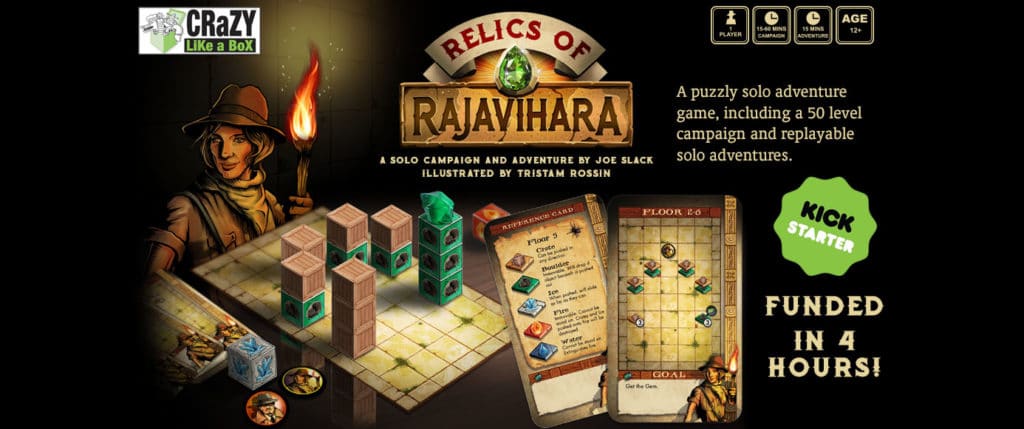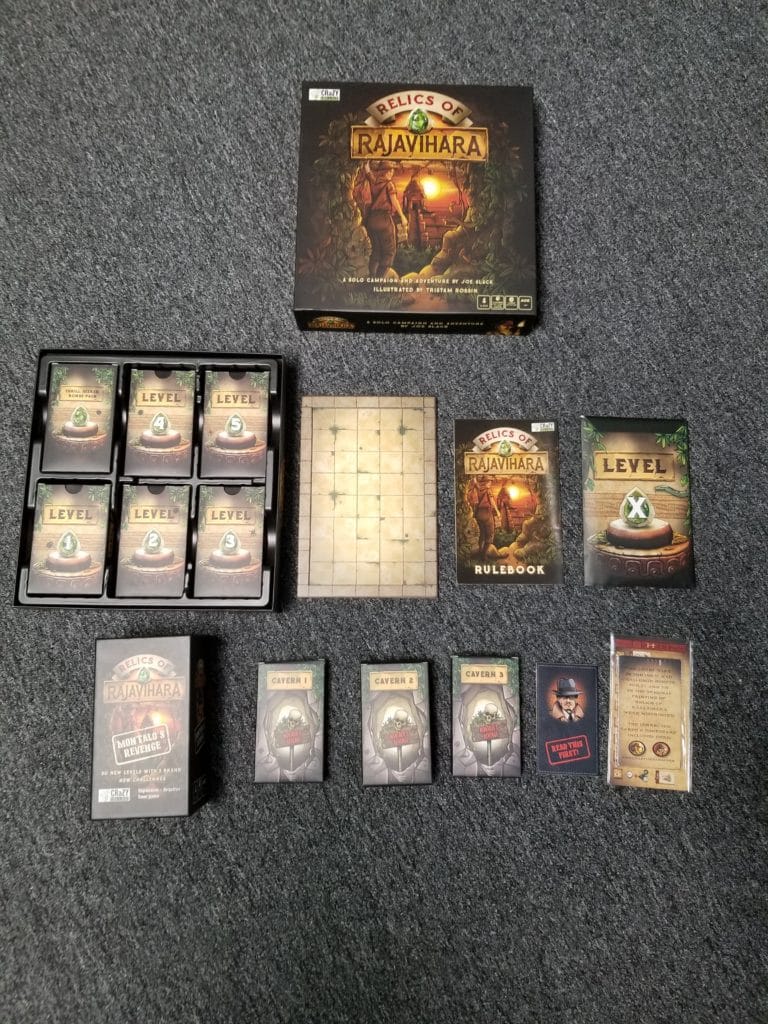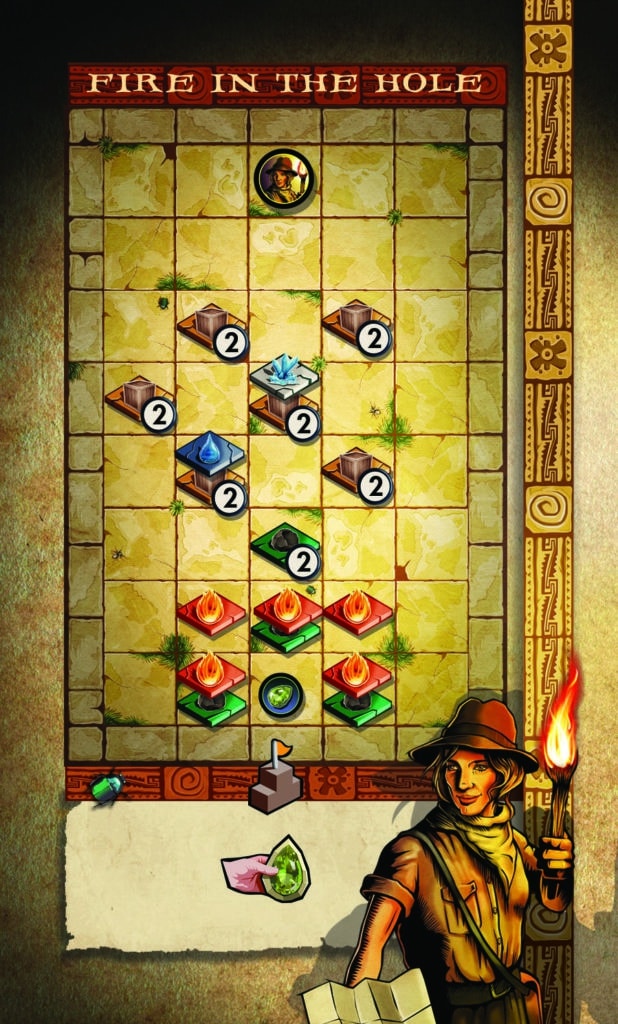Hey there. It’s Joe Slack from the Board Game Design Course. The Fulfullrite team asked me to share my thoughts on how to provide excellent customer service and I was honoured to help. In this article, I’ll go into how to under-promise and over-deliver with your Kickstarter or other crowdfunding campaign to ensure your backers are happy and want to continue to support you in the future. I hope you enjoy this article!
When I launched my Kickstarter campaign for Relics of Rajavihara, one of my goals was to create a great experience for my backers. I wanted to ensure their voices were heard and that they received a great game in return for showing me their support.
I thought a lot about stretch goals, unannounced bonuses, and how to make them say “Wow!” when they first open the box, as well as when they actually played the game.
But no matter how much you plan, there are often issues that will arise. Sometimes these matters are completely out of your control. But you still have to deal with them.
It’s not so much that something went wrong (it’s almost inevitable, whether it’s something big or small), but how you handle the problem. It’s about fixing these problems and showing your supporters that you are there for them. That’s what will keep them returning to your future campaigns.
Stretch Goals
One of the biggest mistakes that a creator can make on Kickstarter is promising too much. This is often in the form of new stretch goals that haven’t been fully thought out, costed, and tested.
When your backers make suggestions to improve your game or the campaign itself (and they will), it doesn’t mean that you have to make every change that’s suggested. You also don’t want to ignore them though. These are people who love what you’ve created and have already pledged their support. They are only trying to make what you’ve created even better.
But that’s not to say that every suggestion will make your game better or that they are even feasible. I had one backer suggest that I replace the 1-inch wooden blocks that players use to move around and solve levels with clear cubes filled with sand. Clearly, this was an interesting idea, but not one that I could seriously consider. Cost, weight, manufacturing limitations, and further testing considerations would make this a no-go.
Another backer suggested neoprene mats. This would have added more cost and bulk to the game, but it also might have hindered gameplay, as the blocks must move smoothly across the board in Relics of Rajavihara. I’ll get into another great reason for not wanting to go this route in the next section as well.
At the same time, you always want to thank your backers for their suggestions. If it is something you’ve already tried but didn’t work, you can let them know this and why the solution didn’t work.
If they are making suggestions that would require extensive playtesting and development work, such as a solo mode or increased player count that doesn’t already exist, you can let them know this is a great suggestion but that you’ll have to consider it for a future version. They will likely understand and be on board with you if you let them know this would seriously delay the delivery of the game and would need to be thoroughly tested before being implemented.
Jamey Stegmaier from Stonemaier Games has mentioned previously that he almost sunk his company with a stretch goal for metal coins that they, fortunately, didn’t reach.

That’s why it’s so important to plan out your stretch goals in advance and not promise extras that you can’t deliver. If during the course of your campaign, someone shares a really great idea, you can absolutely look into this. If your manufacturer can make this change and it won’t add a lot of manufacturing cost or excess weight to your game and also doesn’t require a lot of development work, then by all means you can at least consider the idea.
Just don’t promise something you either can’t deliver, will delay the delivery of the game, or will require you to go back to your backers for more money to complete. These would be cases of over-promising and/or under-delivering, which of course, you want to avoid.
Extras
Sometimes you’ll be able to include some extra bonuses for your backers that weren’t mentioned or at least weren’t promised during the campaign.
These could be anything from promo cards to component upgrades to a signed thank you note.
One great suggestion I had during my Relics of Rajavihara campaign was making the board dual-layered. This would prevent blocks from sliding off the board and keep everything nicely contained.
But I didn’t want to promise this without testing it first. So, I thanked the backer who made the suggestion and let them know I would look into this. After speaking with my manufacturer, this idea sounded feasible and didn’t add too much to the production cost, so I asked them to send me both versions of the board when they produced the sample.
It turned out that the dual-layered board worked really well, so I asked them to include this with all the games. It was an additional cost for me, but I felt it was worth it. Backers also really liked this new addition.

I hadn’t planned on including any stretch goals for my follow-up expansion campaign, Montalo’s Revenge. However, a couple of backers asked about including some bonus levels, similar to my previous campaign. Fortunately, I had some extra levels I had been working on and I had several volunteers test them, which meant these could be easily included. So, I was able to include these extra levels as part of the game as an added bonus.
Wow Factor
When someone opens your game for the first time, what will they see?
Will they see a huge box with very little in it?
Broken parts and pieces all over the place?
Or will they be amazed by a well-laid-out box with lots of high-quality components?
Presentation is important.
For Relics of Rajavihara, I wanted to evoke the feeling of curiosity. When you open the box, you’ll take out the board, a mysterious-looking “X” envelope, and the rules. Below this is a beautifully laid-out insert with five numbered tuck boxes. Each time you beat a floor you get to open the next one and see what your next challenge is.

Not only that, inside each tuck box you’ll find a deck of tarot-sized cards with an all-new set of levels to explore, marked very clearly so that you’ll know you’re completing them in the right order. Along with these cards, you’ll find new blocks. Solid, 1-inch wooden blocks that have been screen printed with images so that they look like crates, boulders, and other obstacles.
Whether your game features minis, standees, or just cards, you can find ways to amaze people when they first open your box and get them playing quickly.
Dealing with Issues
As I mentioned earlier, problems will occur. No matter how much attention to detail you have and how much meticulous planning you do, some things will be out of your control.
Two and a half years ago, did anyone have both a pandemic and a shipping crisis on their bingo card?
Then there are the production issues, misprints, missing cards, and all the other things that can go wrong in manufacturing.
So, it’s not about what happens, it’s about how you deal with it. Keep your backers in mind (and in the loop!) and do what you can to rectify any issues quickly. That’s how you provide excellent customer service.
For example, it was discovered only after my Relics of Rajavihara games were shipped and backers started playing the game that one of the bonus level cards was missing an icon. This was pretty crucial, as the level was otherwise unsolvable.
And then it was discovered that two specific challenges in the after-campaign adventure didn’t work with certain combinations of other challenges. So, I tested and tested, had others play the revised levels and challenges, and then I fixed the issue.
But it’s not like a video game where you can apply a patch. The only way to correct mistakes like this is by re-printing the cards.

Fortunately, the levels in my game are standalone and will often only be played once. I was also in the process of planning my next Kickstarter campaign, which was the expansion for Relics of Rajavihara.
So, I offered my backers a choice. They could get a physical reprint of the cards and challenge sheets, download PDF versions of these right away, or get a re-print included for free in the expansion if they planned on purchasing this. Regardless of their choice, I provided the PDF for them to access right away.
Everyone was very appreciative and I was humbled by the many comments on the excellent customer service I provided. I was just trying to do the right thing!
In other cases for individual backers, there were more minor issues such as a missing tuck box, damaged block, or a misaligned board, all of which were corrected quickly by sending replacements once I was notified of the issue.
The key point to all of this is tackling issues as they arise and making things right.
Wrapping it up
Whether it’s dealing with a printing issue, damaged component or box, ensuring all your stretch goals are well planned and actually feasible, including a little something extra that backers weren’t expecting, or presenting your game well, it’s all about delivering a memorable experience.
You’re much better off under-promising and over-delivering, whether it’s related to timelines, components, or other aspects of your game rather than promising something you can’t guarantee or you can’t deliver and then ending up biting off more than you can chew.
If you give people more than they expected, you could end up with a fan for life.
If you’re thinking about launching your game on Kickstarter sometime in the future, check out my free Kickstarter Success Checklist. It will give you step-by-step pre-launch steps, a list of important tasks to complete right after you hit launch, and tips on how to keep your campaign going strong.

Joe Slack is a board game designer, publisher, instructor, and the author of the #1 international best-selling book, The Board Game Designer’s Guide, along with 3 other books on game design. He has taught Game Design and Development at Wilfrid Laurier University and runs the Board Game Design Course, an online course for new game designers. Joe has 4 games published with other publishers (Zoo Year’s Eve, Kingdom’s Candy: Monsters, Four Word Thinking, and King of Indecision) and one self-published game (Relics of Rajavihara) and expansion (Montalo’s Revenge).
You’ve done everything by the book. Your Kickstarter campaign is almost ready to launch.
You made a great product. Built an audience. Set up a campaign page.
But how do you ship it?
We put this checklist together to help you get started. It's free.




